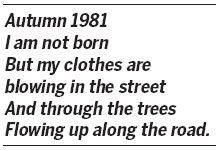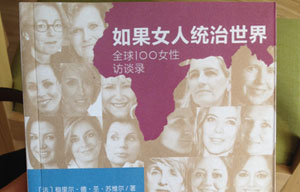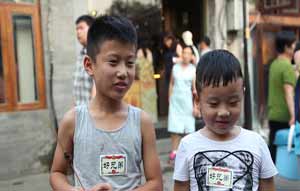Switching tongues, marrying languages
Updated: 2013-05-31 13:18
By Kelly Chung Dawson (China Daily)
|
||||||||
In a section titled "Night Fall", Xu's poems intersperse Chinese and English, with full English translations presented alongside the originals. The English words that appear in the originals often do not correspond to the English translation, a deliberate disorientation intended to make the reader question their assumptions about language comprehension, Xu says.
Her work is influenced by her brief employment as an archivist for the artist Xu Bing, who has experimented with nonsensical Chinese characters that appear real to non-native readers.

"It was important for me to see how (Xu Bing) dealt with the problems between language and representation," she says. "People who don't read Chinese assume his work is legible, but there is a dissonance for readers who actually understand Chinese and can recognize the parts of real words that he uses to create his characters.
"They experience his work in a strange, abstract way as they struggle to reconcile that familiarity. That was very inspiring for me."
Forrest Gander, a Pulitzer Prize finalist for his book Core Samples from the World, notes Xu's use of duplicative language in her work as an example of Chinese influences. The Chinese language is full of such duplicates, like "ma ma hu hu" ("meaning so-so"), he notes.
Xu also explores disjointed phrasal sequences, working outside the traditionally American concerns of determinative syntax, he says.
"She is one of the most exciting young American poets today, and her work is going to influence the direction in which American poetry moves. There is an internationalism to her work, which is unique and exciting."
Xu's contemplations on friendship also reflect her non-Western influences, he says.
American and European poetry has tended to focus on the more dramatic narratives of love and loss, whereas Chinese poets have been more willing to explore the less-glamorous arena of friendship.
In a section titled "Our Love is Pure", she writes: "Friends to whom I belong/ Friends whom I will wrong."
The book's cover features a painting by Xu, a lush landscape inspired by the French painter Henri Rousseau.
Much like the iconic poem paintings of ancient China, Debts & Lessons presents the author's words with a visual accompaniment befitting of a book that pays respects to a language that for her, has stimulated both alienation and awe.

 Victoria Beckham S/S 2014 presented during NYFW
Victoria Beckham S/S 2014 presented during NYFW
 'Despicable' minions upset Depp's 'Lone Ranger' at box office
'Despicable' minions upset Depp's 'Lone Ranger' at box office
 'Taken 2' grabs movie box office crown
'Taken 2' grabs movie box office crown
 Rihanna's 'Diamonds' tops UK pop chart
Rihanna's 'Diamonds' tops UK pop chart
 Fans get look at vintage Rolling Stones
Fans get look at vintage Rolling Stones
 Celebrities attend Power of Women event
Celebrities attend Power of Women event
 Ang Lee breaks 'every rule' to make unlikely new Life of Pi film
Ang Lee breaks 'every rule' to make unlikely new Life of Pi film
 Rihanna almost thrown out of nightclub
Rihanna almost thrown out of nightclub
Most Viewed
Editor's Picks

|

|

|

|

|

|
Today's Top News
Going green can make good money sense
Senate leader 'confident' fiscal crisis can be averted
China's Sept CPI rose 3.1%
No new findings over Arafat's death: official
Detained US citizen dies in Egypt
Investment week kicks off in Dallas
Chinese firm joins UK airport enterprise
Trending news across China
US Weekly

|

|










